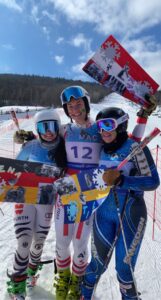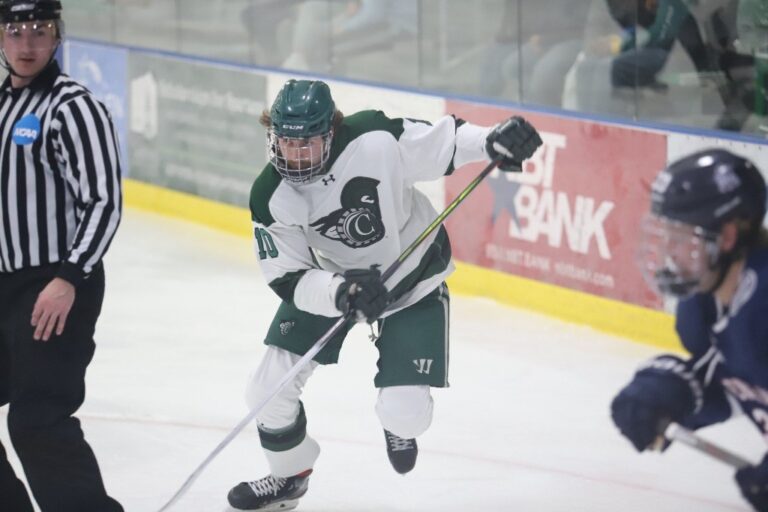International skiers bond team

With 11 athletes from nine different countries, the Castleton men´s and women´s Alpine ski teams have the by far biggest number of international students on their team, a huge factor for the team’s success this season.
“Castleton is known as the school that has all the internationals,” says Lena Soehnle, a senior Alpine ski racer from Germany.
Knowing Castleton is a very small town in very rural area, one wonders why so many international students find the school. Talking to four members of the team, their motives for going abroad couldn’t have been more diverse.
“I saw another European girl ski race in the United States, started following her on Instagram and asked how she found out about Castleton … that is basically how I got here,” said Austrian senior Karoline Rettenbacher, who always dreamed about going abroad.
Teammate Lena Soehnle, from Germany, on the other hand never really thought of living on the other side of the pond.
“One of my friends from home went to the States to play tennis, so he convinced me to give it a shot,” Soehnle said.
Sophomore Camille Jackson describes her personal pathway to Castleton as “a really quick turnover.” The Australian started dreaming about going abroad only six months before she came here. One of the main reasons to go abroad for all the girls, however, was the possibility to continue ski racing while earning a degree, a combination rarely to be found across Europe, explained sophomore Petra Veljkovic from Serbia.
“Literally why I chose Castleton is because of the coach,” she said, laughing. “He simply replied the fastest.”
Jackson strongly agreed.
“He was super enthusiastic, super open, and just showed that he really wanted us to be here,” Jackson said.
The location was also a positive rather than negative factor in the decision making for all of them. The possibility to train at a World Cup venue in Killington was convincing and “Vermont is just really beautiful,” said Jackson, who prefers the rural area over “intimidating big universities” in cities.
Despite coming from locations all over Europe and the world, all four see one big difference between ski racing in the U.S. and at their homes. They all pointed out that while skiing at home is a solely individual sport, here in the U.S., you practice and race as a team.
“It´s a whole different mindset,” said Soehnle. “At home, when you screw up in a course, you just ski out and no one really cares. Here, you actually got to hike up and stay in the course, so your team still gets a time.”
Rettenbacher also highlights the team aspect as one of her biggest takeaways from going abroad.
“Even though you play an individual sport, it doesn’t mean you can´t be part of a team. It is so much fun to see my teammates succeed and it really led me to realize that as a team, you can accomplish so much more,” she said.
If you ask head coach Christopher Eder about differences between his European and American skiers, he made a different observation. While Americans tend to train in their training shorts or full jackets, a lot of internationals would strip down to their race suits even in training sessions.
“They have the mindset of this isn’t just a training run, this is a race run,” said Eder, who has been coaching at Castleton for 19 years.
During his time as a coach, he saw how Americans started stripping down to their race suits as well, showing that “the European mindset is kind of rubbing off on them.”
While gaining a multitude of benefits from going abroad personally, the four women also see the local Americans profiting from skiing with internationals.
“You learn a lot about different cultures, also skiing wise. You get to see how other countries do it and learn from each other. That’s a benefit for all of us,” said Rettenbacher.
“I think we influenced the whole training culture here for a bit.”
Soehnle agrees with her teammate.
“I think Americans live in a little shoe box, at least some of them,” Soehnle said, smirking. “It´s good for them to see there is a world outside the U.S., which they tend to forget sometimes.”
A lot of times, she would hear peers regretting not having paid attention in their Spanish or other foreign language classes because they realize that “being able to speak another language is actually a pretty cool thing.”
Eder too believes that both sides benefit from having such a diverse team, not just on the slopes.
“Having internationals in the classroom is valuable; it turns discussions from a narrow minded to a global perspective.”
Eder has been known for an exceptional recruiting of internationals for years and many believe he is going after them solely for their athletic abilities. However, he points out that it is not him actively seeking internationals, but rather them contacting the coach.
“For me, it doesn´t matter if they are from Austria, Serbia, Australia, or Vermont,” he said. “If they can ski and are good racers, I show interest in them.”
When he is picking up his athletes from the airport for the first time, Eder usually asks what ultimately made them choose Castleton.
“As simple as it sounds, a lot of times they say `because you emailed the most,`” said Eder, laughing. “I take a lot of pride in that – answering emails, doing video calls, simply staying in contact with the athletes before they come here.”
As for how it’s working, the women´s team has won all of the eight races so far and for the men´s team, each race was won by a Castleton skier. While this is an outstanding statistic, Eder points out the teams haven´t peaked yet.
“We want to peak at the right time, which is for Regionals and Nationals at the end of the season,” Eder said, convinced of his teams’ abilities. “We want to leave there with some hardware, some trophies. We want to be on top of the podium as a team.”
Besides having ambitious goals for the reminder of the season, Eder in general just loves to see how his skiers come to Castleton as individuals, build relationships throughout the years and “when they leave, they made friends with people from all over the world, which is simply the coolest thing.”
After highlighting all the remarkable features of the ski teams, one might wonder if there are any downsides of having internationals.
“Oh yes,” Eder said, without hesitation. “Trying to get them all here from the airport.”








